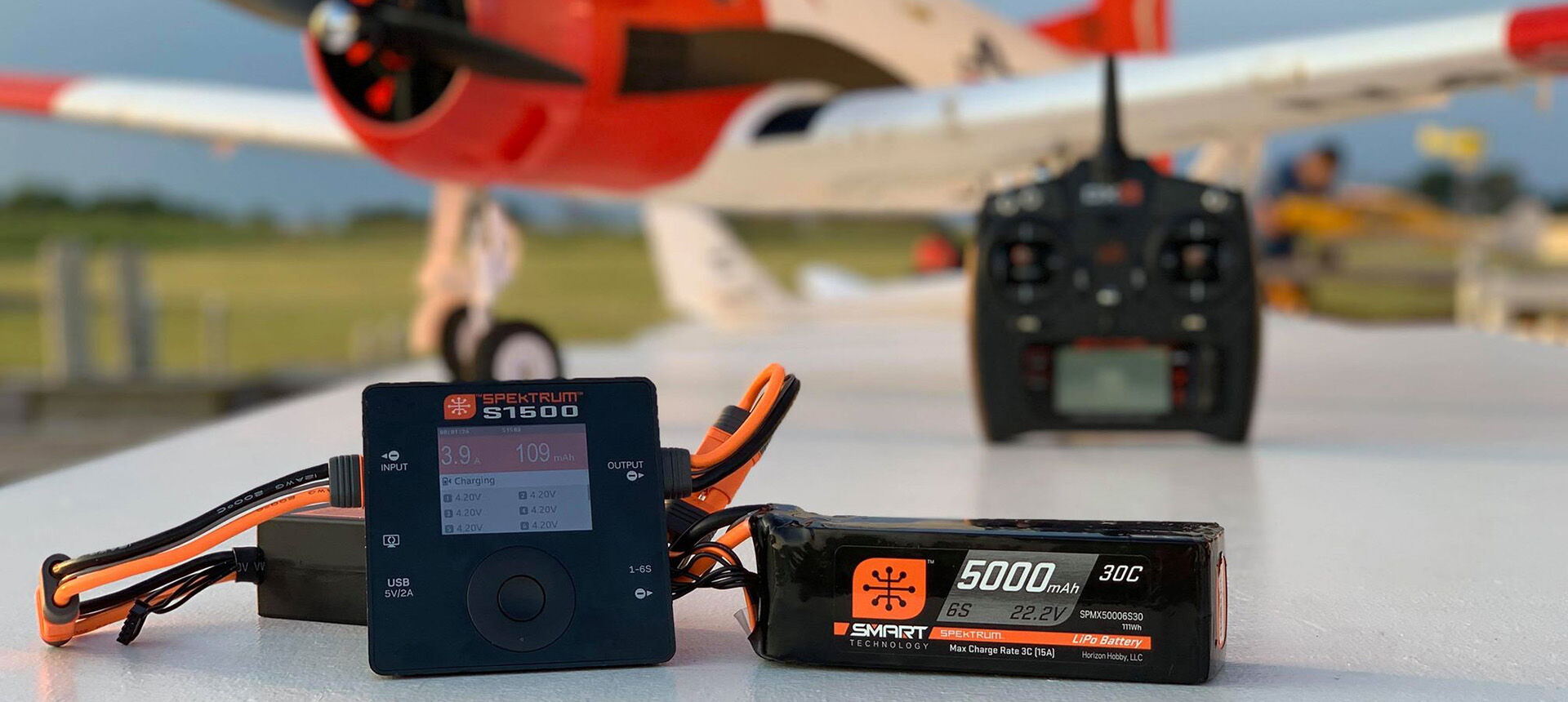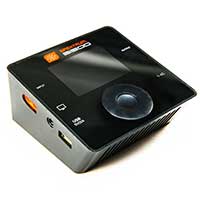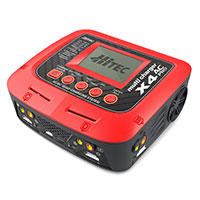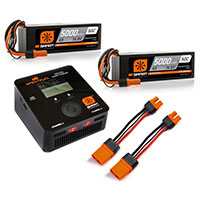
Wattage vs Amperage
Posted: 10/23/20
Battery Charger Basics:
We must preface this discussion by first discussing the battery charger itself. New customers often discover that the quest for the perfect battery charger is one fraught with several issues. These issues can steer customers into a perfect storm of confusion as they try to decipher industry-specific terminology, fancy marketing, and brand-driven proprietary standards. In the worst-case scenario, a customer makes their decision and experiences buyer’s remorse when their charger doesn’t meet the standards of their charging needs. Horizon Hobby is here to help!

Generally, we find that the radio control industry often uses common specifications to rate their battery charger(s):
- Battery Chemistry (LiPo, NiMH, LiFe, NiCd, etc.)
- Connector Type (IC, EC, Deans, Star, Tamiya, Bullet, etc.)
- Input Voltage (AC/DC)
- Additional Features (storage, discharge, balance, etc.)
- Outputs (single, dual, quad, etc.)
- Charge Rate (often marketed as amperage)
A savvy shopper will find that most of these attributes are relatively easy to navigate and base their purchasing decision around them. However, there is one specification that manufacturers use to guide customers down the wrong path: Charge Rate.
Often when selecting a new charger, the charge rate is perceived as “most important” because it describes the amperage the charger can deliver. Unfortunately, this has led to misinformation and confusion across the industry. The actual charge rate of a charger directly correlates to what wattage the charge can deliver. The general rule of thumb is AMPS = WATTS / VOLTS.
- Amps (or amperage) is defined as the strength of an electric current in amperes.
- Volts (or voltage) is defined as the difference in electric potential between two points, which (in a static electric field) is defined as the work needed per unit of charge to move a test charge between two points.
- Watts (or wattage) is defined as a derived unit of one (1) joule per second and is used to quantify the rate of energy transfer.
So, you want to buy a “fast charger?” Do the math!

A charger may be marketed as being capable of charging at 10 amps, but in reality, it may only deliver 50 watts of energy. A 50-watt charger could indeed charge a battery at 10 amps, but only if it’s a 1S LiPo pack. Using our formula above, the practical amperage delivered by the charger is actually 50W/4.2V=11.90A. In this scenario you could get almost 12 amps out of a 50-watt charger had the manufacturer not limited its output to 10 amps. However, if you tried to charge a 2S LiPo battery with the same 50-watt charger, the maximum charge rate would be UNDER 6-amps (50W/8.4V=5.95A). The amperage gets worse as you increase the required pack voltage (or cell count). For example, a 50-watt charger would only be capable of charging a 6S battery at 2 amps (50W/25.2V=1.98A)!
Further compounding this is charging time. Keep in mind that charge time is derived by taking the mAh (or milliamp hours) and dividing it by the charge amperage (see formula/example below). As a result, a 50-watt charger would require a great deal of time to charge almost any size battery pack. Let’s take a few common battery sizes and determine their actual charge times assuming the battery is COMPLETELY dead (which would never actually be the case). Also, it is important to consider a battery manufactures recommended maximum charge rate or “C” rating. A general rule of thumb is to never exceed a charge of 1C unless the manufacture explicitly states it is safe to do so. Bearing this in mind, charging a 500mAh 1S battery at 10 amps would be very dangerous (well exceeding the safe 1C charge rate of .45 amp) so we will avoid using that as a sample. A 2S 5000mAh pack charging at the 6-amp rate we determined above would take .83 hours (5.000/6V=.83). This isn’t a terrible outcome until you consider larger battery sizes, such as a 6S 5000mAh pack. That sized battery would take over two and a half hours to charge (5.000/1.98V=2.53)!

In contrast, a different charger may be marketed as being a 10-amp charger, but it can drive 500 watts of energy. This charger (a much better option) can crank out some serious power! We already determined the 1S pack mentioned above only really needs a 50-watt charger, so we will forego the math again. Now, remember our 2S pack above? This 500-watt charger could technically charge it at 59-amps (500W/8.4V=59a)! But, charging at 59 amps would be quite dangerous, hence the reason many manufacturers limit the available charge current (10 amps for example). Finally, our high voltage 6S battery can now be charged at almost 20 amps (500W/25.2V=19.84A). What a difference!
The greatest advantage of a higher-watt charger is the time saved during charging. Continuing with our examples above, we can determine that our 500-watt charger would make quick work of almost any battery (use the formula above to determine your specific need). The limiting factor now really does become the charging amperage since we are able to charge at the full 10 amps regardless of the battery voltage/capacity. At this point, it becomes increasingly important to be mindful of the “C” rating your battery manufacture recommends the pack be safely charged at. This directly relates to battery cell quality (wire size, cell quality, etc.). If your 6S 5,000 mAh battery is only rated for 1C, you can only safely charge this battery at 5 amps. If the battery is rated for 2C or above, you can charge at the full 10-amps (for the examples given above). More on C-rating in a future article.
Finding the Perfect Charger:

One final thought. Battery chargers with multiple outputs often share the wattage across output channels. As a result, you may find that a 200-watt quad-charger is 200 watts total, NOT per channel. It is important to be mindful of this when selecting your new charger and read the specifications clearly. If you plan on charging four high-voltage batteries at once, you may need to hunt for a charger that can deliver a higher wattage. Otherwise, you are basically back to charging four high-voltage batteries at only 50-watts each!
The most important takeaway is to consider your individual needs. Obviously, the budget will be the first limiting factor, but also consider what type of models you are driving/flying. Do you have large-scale models that require high-voltage and/or high capacity batteries? Do you plan on purchasing (or already own) multiple types of batteries? Do you plan on charging at the track/field? Is time-critical to your RC adventure or do you simply need to get the job done?
Luckily, Horizon Hobby has a charger that will fit into almost any budget AND any circumstance! Looking for a smarter solution? Take a look at Spektrum Smart Charging Technology! Preset charge, discharge, and storage parameters are automatically relayed from your Spektrum Smart Battery making charging as simple as pressing the “Start” button on the charger. The charge rate of individual batteries can be user-customized so you can take full advantage of packs with faster charge ratings. Plus, when combined with Spektrum Smart Batteries, the charger automatically recognizes battery chemistry, cell voltage, and capacity to ensure that you are always charging with correct settings, virtually eliminating the potential for charging batteries set to the wrong settings.
Be sure to check out the full selection of chargers including Spektrum Smart Technology. Just be mindful of how important battery WATTAGE is, not just the marketed charge amperage!
LiPo Battery Voltage Cheat Sheet:

- 1S LiPo = 4.2v
- 2S LiPo = 8.4v
- 3S LiPo = 12.6v
- 4S LiPo = 16.8v
- 5S LiPo = 21.0v
- 6S LiPo = 25.2v
Formulas
- AMPS = WATTS / VOLTS (used to determine your chargers max charge rate in amperage)
- Example: 50-watt charger / 25.2-volt battery = 1.98amp max charge rate (50/25.2=1.98)
- T = Ah / A (used to determine time-required for a full-charge)
- Example: 5000mAh battery / 1.98 max charger amperage = 2.53 hours required for full charge (5.000/1.98=2.53)
Shop The Story

Words by Kyle Roberts (Contributor)
Kyle began his adventure into the world of RC back in 2005, where he began his tenure in the surface segment. He is a TLR/Spektrum Team Driver and joined Horizon Hobby in 2017, where he has ventured into the world of flying both RC helicopters and RC planes. Kyle earned a Bachelor of Science in Marketing degree from the University of South Florida.
Related Articles

Find Replacement Parts Fast at an Online Hobby Store
Locate almost any RC model replacement parts quickly and easily when you shop for them at an online hobby store.
Learn More

Finding Your RC Passion (and Sharing RC with Others)
How do you help someone find their RC passion? Or if you’re here just thinking about the hobby for yourself, how do you start finding your own RC passion?
Learn More

How to Pack Your RC Car Tool Kit When Traveling by Air
Learn how to pack an RC car tool kit when traveling by air to meet TSA security requirements and avoid losing your RC tools.
Learn More